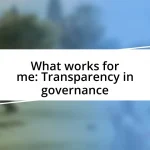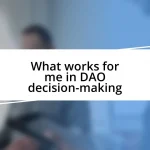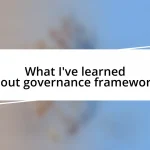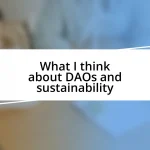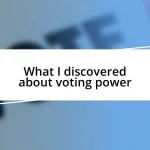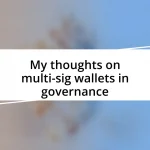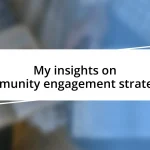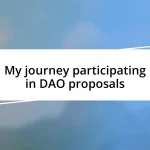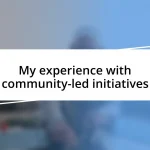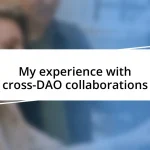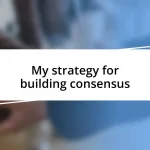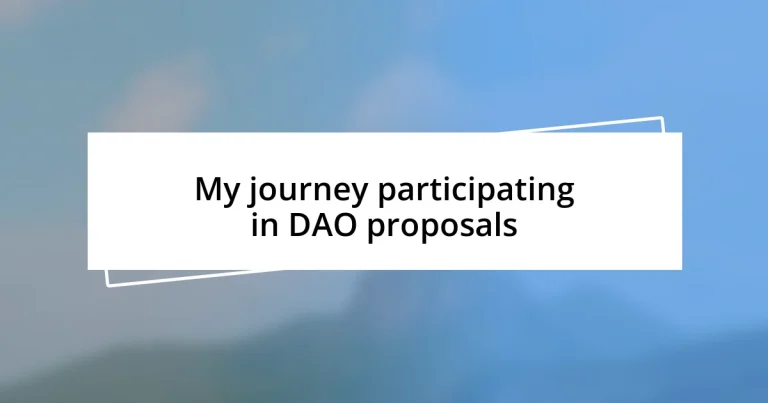Key takeaways:
- DAOs promote decentralized governance through community collaboration, relying on smart contracts to ensure transparency and trust in decision-making.
- Active participation in DAO proposals empowers members, fosters accountability, and cultivates a sense of ownership, ultimately shaping the organization’s future.
- Engagement and adaptability are crucial; learning from feedback, being transparent, and celebrating collective achievements enhance community connections and support for proposals.
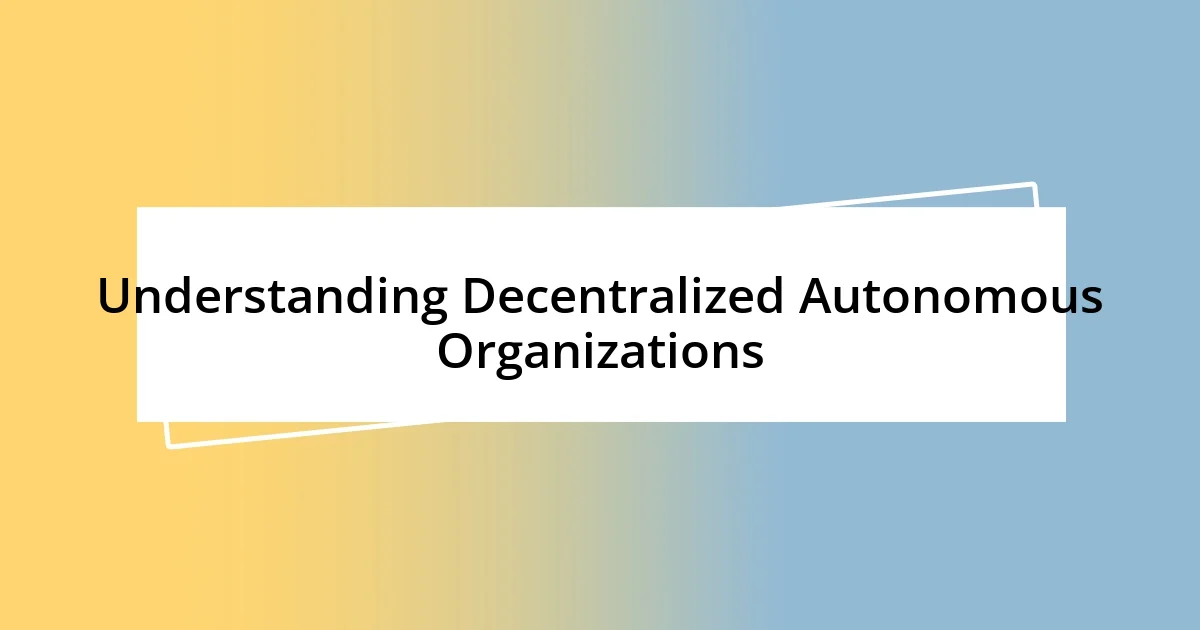
Understanding Decentralized Autonomous Organizations
Decentralized Autonomous Organizations, or DAOs, are revolutionizing how we think about organization and governance. Imagine a global community making decisions together without traditional hierarchies. I remember when I first joined a DAO; the sheer excitement of everyone contributing ideas made me feel like I was part of something groundbreaking.
A key feature of DAOs is their reliance on smart contracts, which automatically execute decisions made by the community. This technology removes the need for a central authority, leading to more transparency and trust. It’s fascinating to think about how my own participation in a proposal process once felt like navigating a labyrinth, yet every vote I cast had real implications for the direction of the organization.
As I became more involved, I realized that the essence of a DAO lies in collaboration and shared ownership. Have you ever felt empowered by a collective? That’s how I felt drafting proposals with other members, knowing every voice mattered equally. DAOs invite us to rethink leadership, shifting the power dynamic and allowing for a more inclusive governance model.
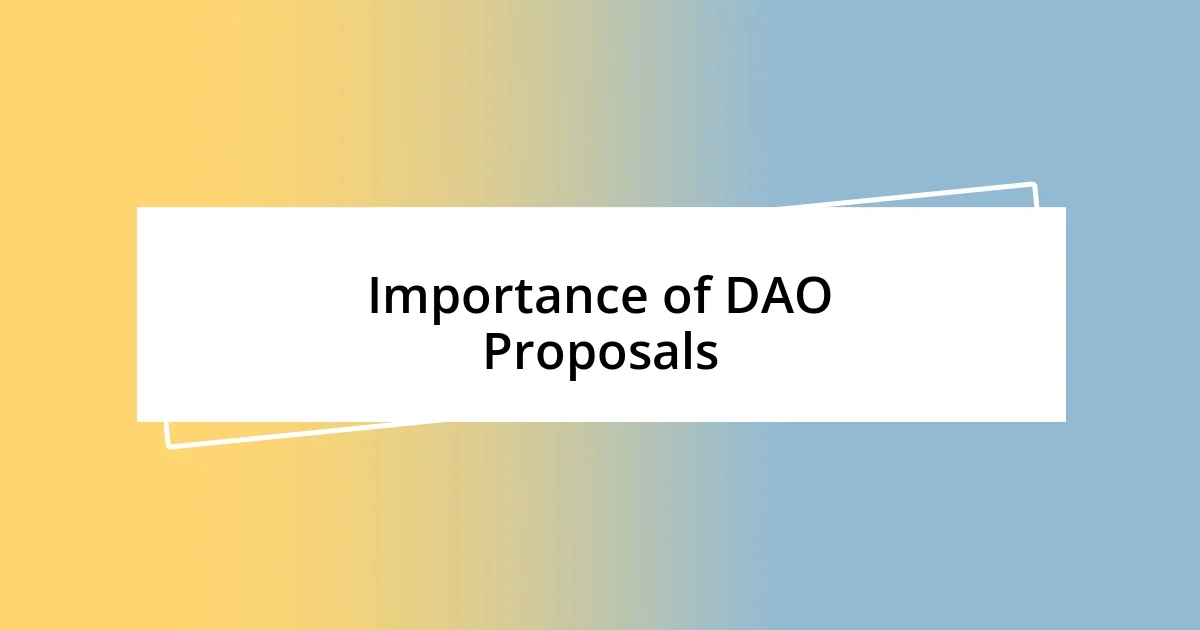
Importance of DAO Proposals
Participating in DAO proposals is crucial because it empowers members to voice their opinions and shape the future of the organization. I remember the first proposal I helped draft—my ideas felt like seeds being planted in a rich garden of possibilities. Each member’s input is essential; it’s more than just voting; it’s about crafting a collective vision for our shared goals.
Moreover, DAO proposals enhance transparency and accountability. I’ll never forget the feeling of clarity when a proposal was presented with detailed explanations and open discussions. It fostered a trust that I hadn’t experienced in traditional settings. This transparency allows members to hold each other accountable, ensuring that decisions reflect the community’s values and desires.
Finally, the process of developing and voting on DAO proposals fosters a sense of ownership within the community. Participating in discussions made me feel like a stakeholder, invested in our shared success. The excitement of seeing a proposal pass—knowing I played a part in that outcome—was incredibly fulfilling. It truly highlighted how my engagement could lead to meaningful change within the organization.
| Aspect | Importance |
|---|---|
| Empowerment | Enables members to influence decisions and contribute ideas. |
| Transparency | Promotes openness and trust through clear processes. |
| Ownership | Fosters a sense of belonging and shared responsibility. |
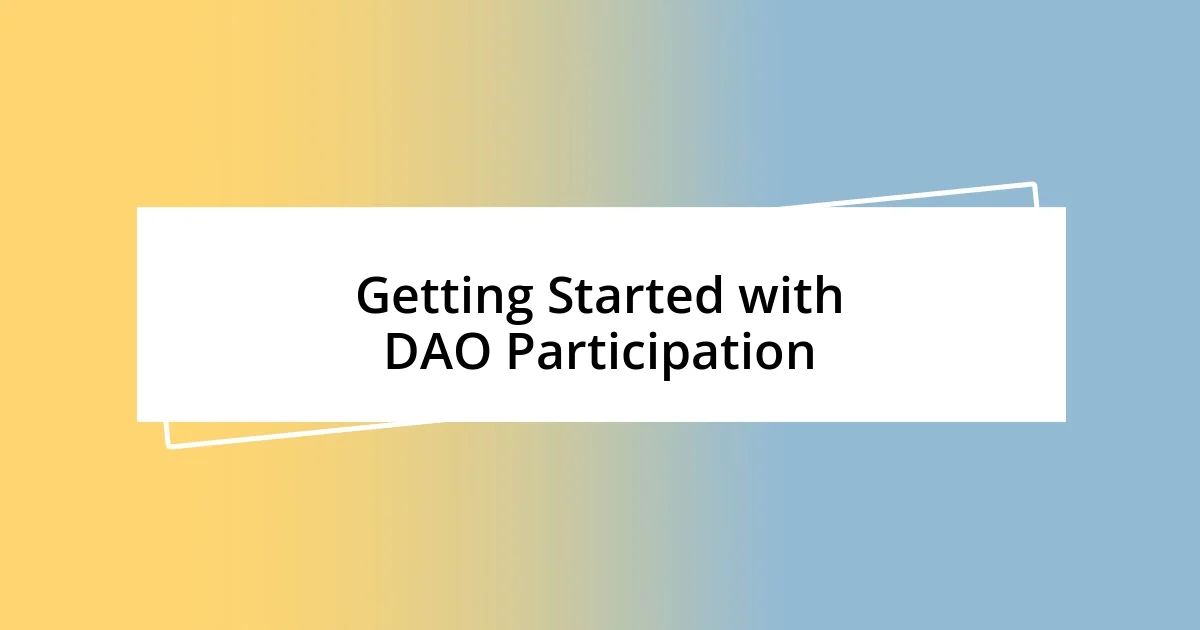
Getting Started with DAO Participation
Getting started with DAO participation can feel daunting at first. I remember the initial sense of confusion I had as I explored various platforms and protocols. The vibrant communities around DAOs, however, quickly helped me overcome that hesitation. Engaging with discussions in forums and attending community calls opened my eyes to the incredible potential of these organizations.
Here are some steps to help you get started:
- Choose a DAO: Research different DAOs that align with your interests.
- Join Community Channels: Participate in Discord or Telegram groups to connect with other members.
- Read Documentation: Familiarize yourself with the DAO’s mission and governance structure.
- Engage Actively: Don’t hesitate to ask questions and share your thoughts in discussions; your voice matters.
- Start Small: Consider voting on proposals to start understanding the process before drafting your own.
The journey of participation is truly a series of discoveries. Each interaction, whether small or large, builds your confidence and enhances your understanding of the collective impact we can create together.
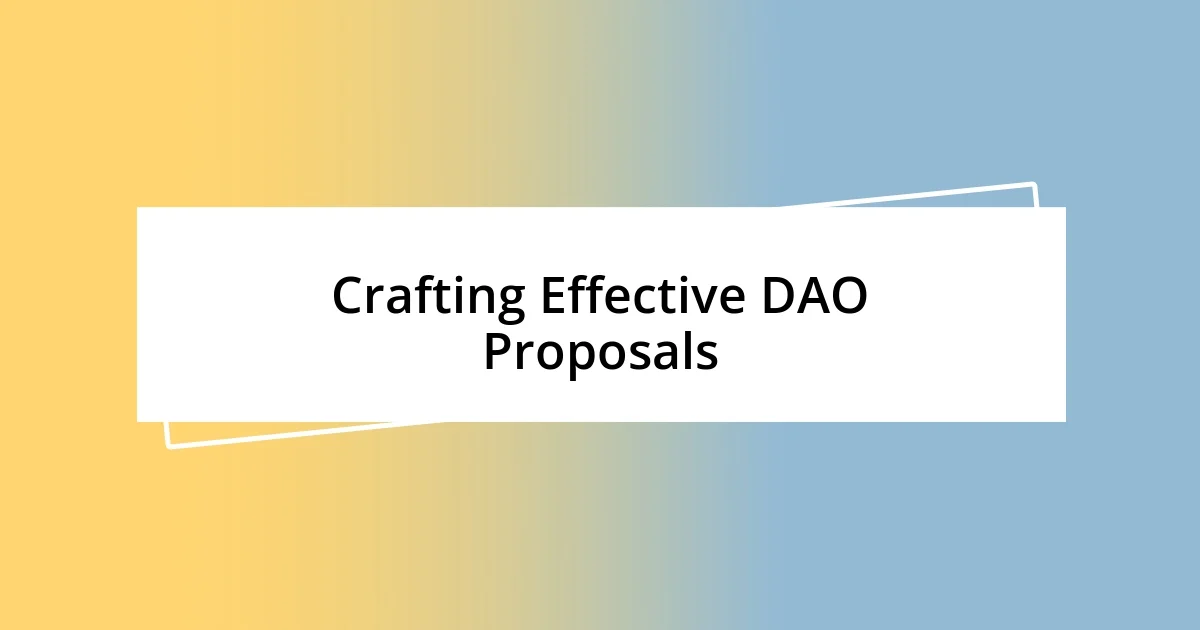
Crafting Effective DAO Proposals
Crafting an effective DAO proposal requires a deep understanding of the community you’re addressing. I recall writing my first proposal, where my biggest challenge was aligning my ideas with the community’s values. I had to ask myself, “What resonates with my fellow members?” That reflection not only shaped my proposal but also made me feel more connected to the collective goals we shared.
Clarity is paramount in your proposal’s language and structure. I’ve learned that using straightforward, concise language invites more engagement. When I submitted a proposal filled with jargon and complex terminology, the response was muted—proof that simplicity is key. Think about it: if your audience can’t understand your vision, how can they support it?
Additionally, including visual aids significantly boosts understanding. In one of my recent proposals, I utilized charts to illustrate potential impacts and timelines. It was amazing to see how these visuals sparked more discussion than paragraphs of text ever could. Visual storytelling often enhances a proposal’s appeal, making the data relatable and sparking enthusiasm among members.
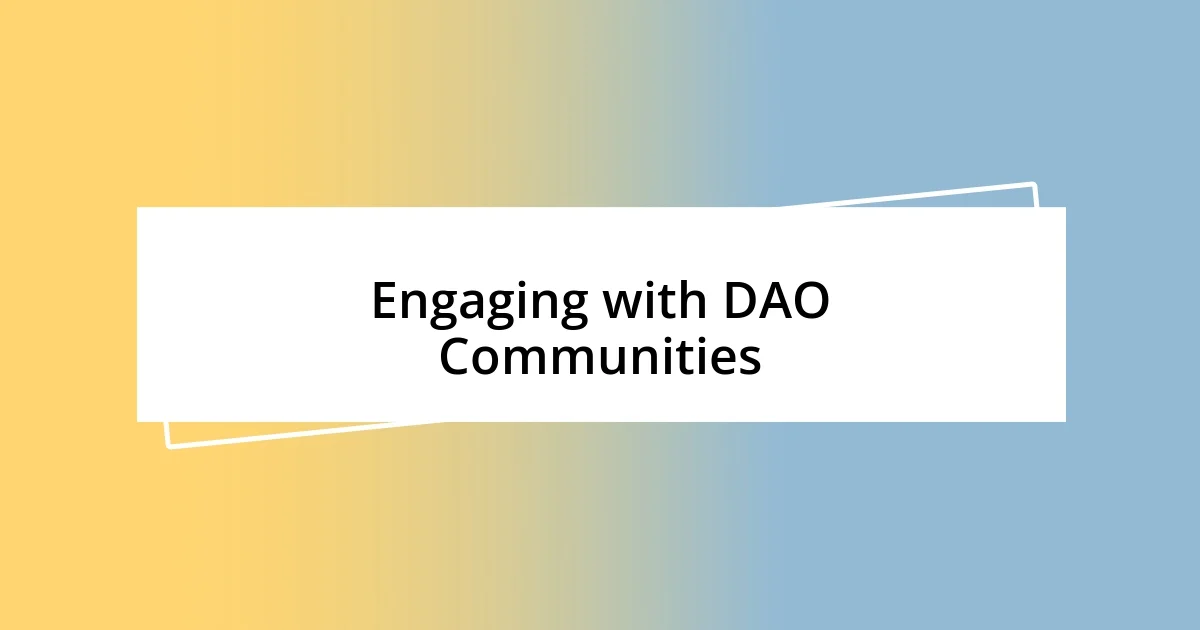
Engaging with DAO Communities
Engaging with DAO communities is like stepping into a vibrant coffee shop where everyone shares ideas and passions. I vividly remember my first community call; my heart raced as I listened to members passionately discussing their visions. At that moment, I realized how personal connections make the experience richer. It’s fascinating how just participating in these calls can spark new insights and collaborations.
Getting involved in discussions isn’t just about sharing your own thoughts; it’s also about listening and absorbing the diverse perspectives of others. I’ve found that asking open-ended questions can lead to deeper conversations. For example, I once asked, “What challenges do you think we face as a community?” The responses were enlightening and revealed common threads of concern that we had not fully addressed before. This kind of engagement is essential for collective growth.
As I continued to participate, I began to feel a real sense of belonging. I’ll never forget the joy of receiving positive feedback on my contributions—those moments transformed my perspective on the impact of my involvement. I often wonder: how many people sit on the sidelines, hesitant to engage? I encourage you to take that leap; your contributions can inspire others and enrich the entire community.
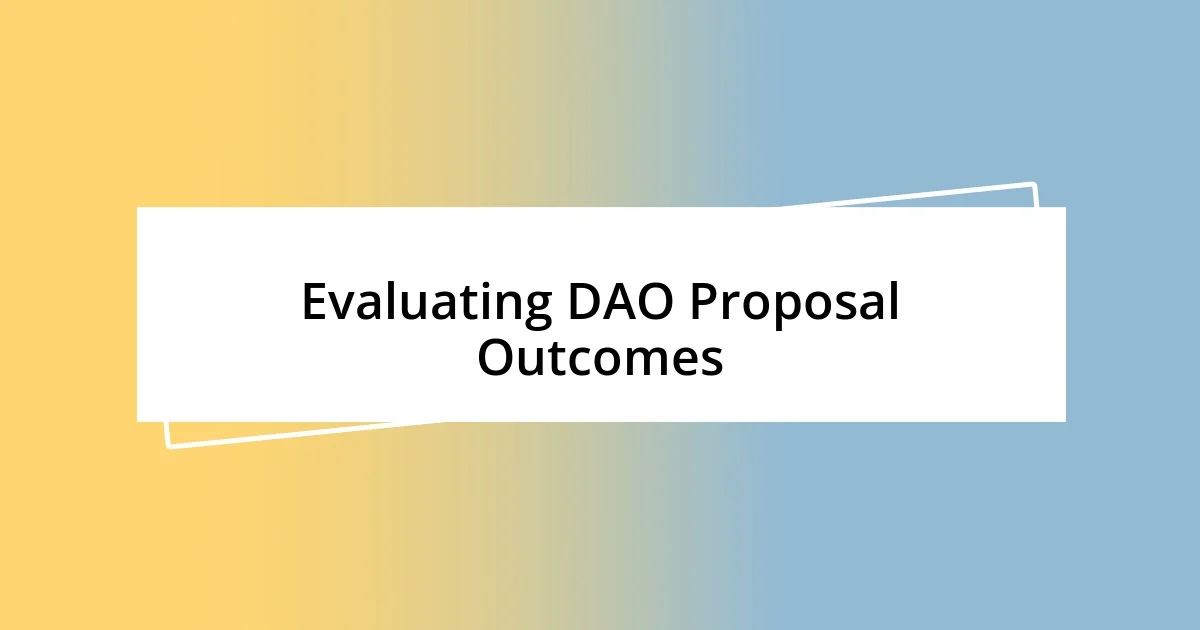
Evaluating DAO Proposal Outcomes
When I assess the outcomes of DAO proposals, I find it essential to reflect on both quantitative and qualitative metrics. For instance, after implementing a proposal I championed, I eagerly monitored not just participation rates, but also the community’s sentiment. That experience taught me that numbers alone can’t tell the whole story; the emotional resonance and collective feedback are what truly indicate success.
Tracking the engagement levels post-proposal is another crucial factor. I once submitted a funding proposal that initially garnered excitement, but over time, I noticed the enthusiasm dwindled. It prompted me to dig deeper—were the promised deliverables met? Were the community’s expectations aligned with the outcomes? Understanding these dynamics was a pivotal moment in my journey, reminding me that ongoing communication is vital.
The real value of evaluating outcomes lies in learning for future proposals. After assessing a proposal that didn’t yield the intended results, I discovered it was due to a lack of clarity in the objectives. It made me wonder: what could I have done differently? This reflection not only helped me refine my approach but also reshaped my perspective on navigating DAO governance. Ultimately, it’s the lessons learned from both successes and failures that pave the way for more impactful contributions in the future.
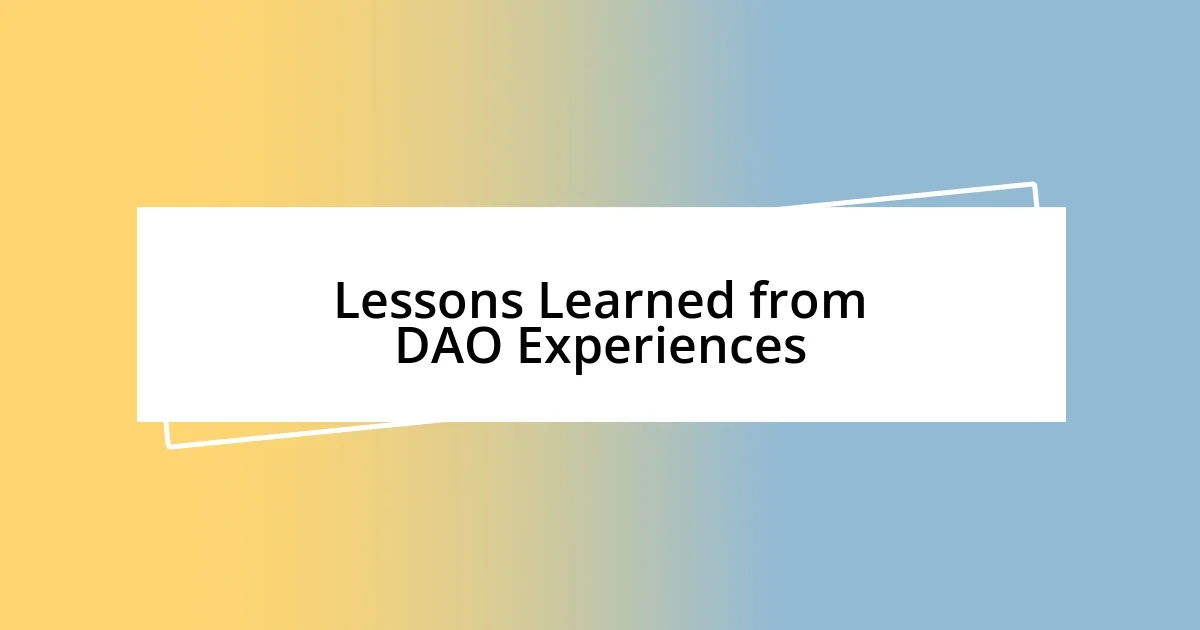
Lessons Learned from DAO Experiences
Participating in DAOs has taught me that flexibility is key. There was a time when I submitted a proposal that I was certain would resonate with the community. But as discussions unfolded, I sensed a shift in sentiment. It struck me that being adaptable, ready to revise one’s approach, can often lead to a more favorable reception. Have you ever felt the need to pivot in your own experiences? It’s in those moments of uncertainty that real growth often occurs.
Another insight I gained is the importance of transparency. During one proposal, I was hesitant to share every detail, thinking it might overwhelm my peers. But as I observed the process unfold, I realized that clarity encourages trust. When I finally opened up about my thought process and decision-making criteria, the trust within the community blossomed. Have you experienced the power of being open in your collaborations? It’s amazing to see how vulnerability can foster stronger connections and contributions.
Lastly, I learned that joy in collective achievement is irreplaceable. There’s an electrifying feeling when a proposal I backed gains traction and, ultimately, realizes its goals. I recall the celebratory shoutouts in community chats after a collaborative project launched successfully; those moments reminded me of why I got involved in the first place. Isn’t it heartwarming to celebrate wins together? It drives home the point that in a DAO, every single voice matters, and each contribution adds to the shared success.
